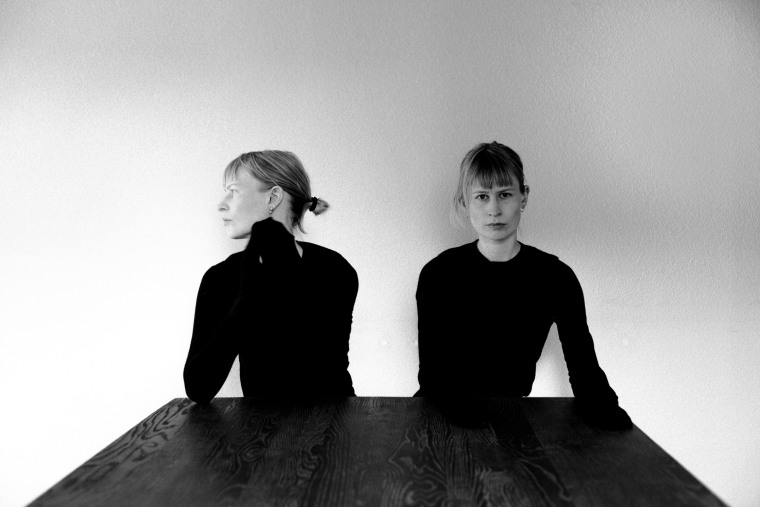Jenny Hval on her beguiling, inquisitive new album The Practice of Love
The Norwegian experimental pop artist on finding stillness in the midst of apocalypse.
 Lasse Marhaug
Lasse Marhaug
Jenny Hval’s seventh studio album, The Practice of Love, opens with what feels like a guided meditation. The voice of Singaporean multi-instrumentalist Vivian Wang instructs the listener to “Look at these trees, look at this grass...study the ants on the ground” over a gentle trance-inducing beat. But as the song goes on and Wang continues to request consideration of more earthly things, the feeling emerges that the conceit is less about accessing some spiritual third eye and more about opening your eyes to begin with.
The themes explored on the Norwegian experimentalist’s follow-up to 2016’s gory-camp Blood Bitch are simple: specifically, the act of re-harnessing basal instincts, memories, and intuition that we’re all born with but may have lost access to in the age of technological and apocalyptic distraction. Love plays a role, but Hval considers the emotion through a more humane and communal lens, especially in regards to the inclusion of multiple voices throughout the album ranging from Wang and Australian musician Laura Jean Englert to Parisian avant-garde artist Felicia Atkinson. “I wanted to have that as a strong part of the album — how music creates connections between people,” Hval explained during a phone conversation. “The intention of placing a track or a voice so that it fits with another person's actions — that’s a practice of love, too.”
The type of love Hval explores is inherently plural, focused on magnifying the invisible strands connecting persons to persons, ghosts, and those not yet born. At a time when every interaction feels myopic in both direction and scale, Hval’s open-ended consideration feels extraordinarily radical — one beyond politics and closer to a remembering of something mystical and ancient. By the end of the eighth track,“Ordinary,” Hval invites Atkinson to whisper, “We don’t always get to choose when we are close, and when we’re not,” and as a listener it’s impossible not to feel a sense of urgent responsibility toward beings outside of yourself — if just for the simple fact that we’re all here right now, together.
What does love mean to you?
One interpretation of love that exists on this album is the need for belonging and to find a place that has empathy. Love is how you speak to and receive others. When I think of love and this record, I think about wanting to speak to somebody and be heard, but in a soft way and not a yell — with little commercial interest. I think of Twitter as the complete opposite. Yes, it does enable communication, but it triggers a type of communication that’s very aggressive and condensed. Part of making music is to always change how I or the world communicates — to create an opportunity for language or communication to mean something else that it doesn't in other areas of life.
Is this something you discovered when between your last album and writing your book Paradise Rot?
I really wanted to investigate the magic of writing, because I wrote a lot about trying to create rituals that bring people that aren’t in the same space or point in history together. A theme that appears in both my book and this album is speaking to past times, experiences, and sensations.
In “Six Red Cannas,” you bring up Georgia O'Keefe and how your music was a sort of communication with her.
I was very specific about having everyone read the words "Georgia" with voices on top of each other to create more of a ritual of awakening or invoking her. There was a magic-potion approach to production — recipes as a guideline for creating tracks.
 Lasse Marhaug
Lasse Marhaug
Can some of these themes about love could be applied to what’s happening in current-day society?
Absolutely. I decided I didn't want to speak in essay form. I needed to write like I was digging — to explore what I wanted to write, instead of what I felt like I should say. I was aware of the harsh political climate. I read a lot about politics — it's become a natural part of my life — but I did want different language to be expressed. I was also tired of how my work was read as provocative, and I wanted to do something really soft. It seems like being political, even if you're anti-capitalist, is a commercial potential because you can interpret it as aggressive.
When I was writing, I really craved a soft place, and that's why I went into a natural landscape — not necessarily a place to hide, but a place to see the world as a more creative place. There’s a pairing of untouched nature with the non-capitalist, non-religious, pagan landscape in the first song that's also linked to an emotional state of not really living according to the norm of the world that's burning. It seems like I made an escapist paradise, and I don't think that's exactly my intention, but you could see it like that.
Did this record change the way you read the news or interact with politics?
I think so. I felt drawn to different ways of reading when I was writing this. I came out of a long period of reading theory and essays, and right before I wrote my novel I got into fiction again. From that, it was reading more poetry and a bit of science fiction. I was trying to put all of these ways of reading together in a way that felt more wholesome than blasting myself with Armageddon. That was something that was lacking in my life for a while — I was excluding other possibilities and interpretations of reality. It was really lovely to extend my diet and rediscover the necessity and potential of fiction.
Were there new practices of love and care that you incorporated into your daily routine?
I was allowed some time to turn around my touring schedule a bit. For several years, I was traveling all the time, so I decided to tone down the touring. It's very problematic, the idea of availability and touring — especially climate-wise. The carbon footprint is terrible. Also, the mental footprint of availability and always being accessible really impacts your life and your mental health. I experienced the need to be more of a person that's still. I also changed my ways after the album was finished, because I got this herniated disc in my back. That was nature telling me, This album is done, you now can't walk. [Laughs]
Can the practice of stillness can exist alongside the responsibilities of being a musician?
I’m not sure. I'm trying to study if this is possible. I guess it's up to the person. The way the world is now, is the more success you have, the more mindfulness you have — that's what the Instagram ads say. It's about privilege, isn't it? You can't really have stillness if you don't have the privilege of it, so it's a total class struggle. I'm not someone who can make a lot of money on my work, but I’m Norwegian and can get amazing support from Norway. We have very sustainable arts funding possibilities, which makes it a lot easier to decide how to work.
But it's still not easy. In music, if you don't do the touring and all the stuff, you're just not seen — and if you're not seen, it's very difficult to be allowed to exist, which prevents us from hearing a lot of great music. I'm always thinking that maybe this is the last thing I do within how I interpret music right now, but I also love the people that I work with, so it's not about hating whoever’s the gatekeeper but realizing that the structures might not actually work as a sane way of living for everyone. I wonder if it's different if you do have power and money and fame. I don't know. I will never know. I'm kind of happy that I will never know.


